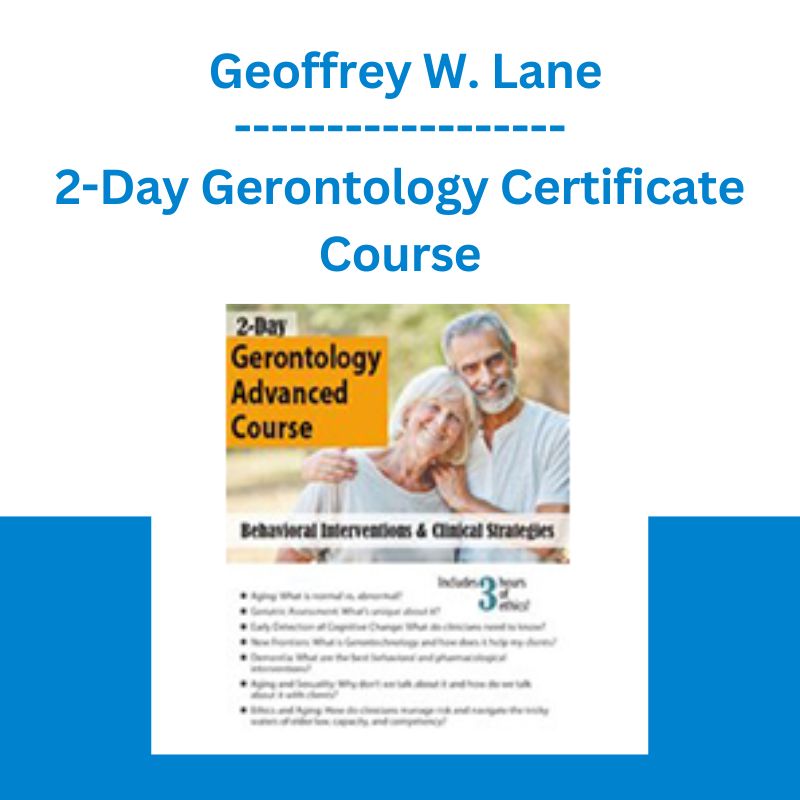*** Proof of Product ***

Exploring the Essential Features of “2-Day Gerontology Certificate Course: Behavioral Interventions & Clinical Strategies – Geoffrey W. Lane”
Staying on the Cutting Edge of Gerontology
America’s older population is rapidly expanding, and the need for well-trained and proactive geriatricians is growing daily. Clinicians working in eldercare need to stay abreast of new and current developments across multiple disciplines to serve our aging clients well.
Many different aspects of aging, along with appropriate treatment strategies, are explored including: normal aging, the promotion of healthy cognitive and emotional aging, aging and sexuality, spirituality and aging, and clinical and ethical issues around death, dying, and bereavement. The course focuses on problems of aging, including special considerations in geriatric assessment, and the mild and major neurocognitive disorders and how professionals can best meet the needs of these clients. The course also addresses the unique ethical issues that arise in the context of eldercare including special considerations in confidentiality, working with adult children of elders, future planning, elders at risk, safety issues and dementia care, capacity/competency, and end-of-life decision-making. After this 2-day comprehensive course you’ll leave with increased confidence in working with your elderly clients.
Speaker
Geoffrey W. Lane, PhD, ABPP, is a board-certified Geropsychologist (ABGERO) who has trained and practiced at nursing homes and research centers in the Veterans Health Administration, and has been staff Geropsychologist at the VA Palo Alto Healthcare System’s Livermore Community Living Center for the last 10 years. Dr. Lane has worked for the Institute on Aging in San Francisco as a neuropsychological assessment consultant, and as a Neuropsychologist for the San Jose based “Rehab Without Walls.” He has a BA in Psychology from Reed College and a PhD from Palo Alto University.
Dr. Lane completed specialty geropsychology training as a predoctoral intern at the University of Medicine and Dentistry of New Jersey (UMDNJ), and as a geropsychology postdoctoral fellow at the University of Rochester Medical Center in New York State. Dr. Lane has clinical and scholarly interests in behavioral management techniques in dementia, gerontechnology, and geropsychological assessment, and has multiple publications in peer-reviewed journals and in edited volumes.
Speaker Disclosures:
Financial: Geoffrey Lane has an employment relationship with VA Palo Alto Healthcare System; and with Avenida, Rose Kleiner Adult Day Health Center. He is newsletter Editor-In-Chief for Psychologists in Long Term Care (PLTC). Dr. Lane receives a speaking honorarium from PESI, Inc.
Non-financial: Geoffrey Lane is a member for Psychologists in Long Term Care.
Target Audience
- Counselors
- Marriage & Family Therapy
- Neuroscience and Neuropsychology
- Nurse Practitioner
- Nurses
- Nursing Home Administrators
- Occupational Therapy
- Physical Therapy
- Psychologists
- Social Workers
- Speech-Language Pathology
Outline
NORMAL AGING AND THE PROMOTION OF HEALTHY AGING
- The Multidisciplinary Field of Gerontology
- Normal Aging
Cognition
Physical health
Mental health
Sexuality - Clinical strategies to promote positive aging
The role of midlife
Socialization
Exercise
Nutrition - Gerontechnology interventions
Supportive systems and aging in place
– Current technologies
– Future horizons
Ethics of technology - Ethics, aging, and future planning
Spirituality
End of life care
Death, dying, and bereavement
WHEN AGING GOES AWRY
- Early detection: When aging is not so normal
- Geriatric assessment: Special considerations
Cognitive
Emotional
Functional - Mild neurocognitive disorders
- Major neurocognitive disorders
Alzheimer’s disease
Vascular Dementia
Parkinson’s
Lewy Body Dementia
Chronic Traumatic Encephalopathy
Dementia
– Clinical presentations
– Behavioral interventions
– Safety issues
– Pharmacological interventions
Other disorders of aging - Risk management: Ethics, aging, and elder law
What clinicians need to know
Elders at risk: Clinical, ethical, and legal considerations
– Confidentiality
– Working with adult children of elders
Capacity/Competency
Dementia and end of life care across cultures - Current research in dementia: causes and treatments
Objectives
- Establish how evidence based theories on aging influence the field of gerontology.
- Determine what constitutes “normal aging” and describe how clinicians can discriminate it from cognitive decline.
- Communicate how clinicians can operationalize research related to nutrition, exercise and socialization to improve the wellbeing of older clients.
- Delineate how technological innovations in living environments can be used to help increase support, independence and quality of life for the elderly.
- Analyze and summarize research exploring the relationship between spirituality, aging and positive health outcomes.
- Specify how the cultural background of clients can impact end of life decisions and care needs.
- Determine an approach to evaluate and assess the cognitive function of geriatric clients.
- Characterize how clinicians can differentiate between types of dementias by understanding the manifestations of each type.
- Evaluate how safety risks related to major neurocognitive disorders in older adults can be identified and mitigated.
- Correlate how issues surrounding aging, dying, and bereavement impact clinical approach with clients and their families.
- Communicate appropriate strategies for clinicians to handle ethical issues related to confidentiality and capacity when working with the geriatric population.
- Connect current research on dementia causes and treatments to potential impacts on clinical interventions in the future.
Please see the full list of alternative group-buy courses available here: https://lunacourse.com/shop/









